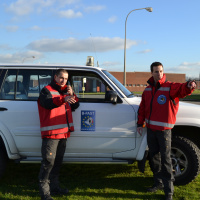CIS Defence

Jeroen Clerckx and Lieven De Cuyper, respectively First Master Sergeant and First Sergeant of the Ministry of Defence's 6th Group Communication and Information Systems (6 Gp CIS) have already been through a great deal together. Therefore, it was only natural for them to be interviewed together.
At the 6th Gp CIS, they are responsible for communication during exercises and missions. Together, with about 15 of their colleagues, Lieven and Jeroen are constantly ready to support B-FAST in the field of Communication and Information Systems. During Typhoon Haiyan, it was they, along with one of their colleagues, who travelled to the Philippines. During missions, they ensure that radio and satellite networks are operational and that everyone can always be contacted and traced because communication between different stakeholders must be guaranteed at all times. They ensure the monitoring of the situation on the ground and make sure that everyone who leaves the camp is identified and is equipped with the necessary communication equipment. Jeroen and Lieven also work to raise awareness among people who are not used to working in a military context: Safety First!
For their military colleagues, Jeroen and Lieven organise training courses within their discipline (practical and theoretical) as much in mission preparation as in general training.
Jeroen and Lieven, how did you arrive at B-FAST?
Jeroen: "After the earthquake in Haiti in 2010, six volunteers were needed in 6 Gp CIS to ensure the provision of a communication and information system at B-FAST. The world of humanitarian aid was completely new for me but, at the same time, it was a great challenge. B-FAST's inter-ministerial working structure and the international dimension was of great interest to me."
Lieven: "The profile was completely compatible with our activities within the Defence department. It is a bonus to be able to help people in need via B-FAST."
Jeroen and Lieven have already participated in different military missions overseas (Afghanistan, Kosovo, DRC). They have been able to put the experience they have acquired in these contexts to use in the frame of B-FAST exercises and training courses, such as, for example, during the INSARAG classification exercise in 2010, the CODRII exercise in Moldavia in 2011, the TUSKER exercise in the United Kingdom in 2012, the TAST training in Germany and TEC training in Sweden. Jeroen and Lieven have also provided their support during different BIC and management training courses during the OSOCC in Tunisia in April 2013 and the OSOCC in Brussels in September 2013.
Jeroen: "International exercises and training are often a unique experience because they provide the perfect opportunity to widen your technical knowledge and learn about other stakeholders' working methods."
Lieven: "Different disciplines have a great deal to share in terms of expertise. You always learn something. You do your utmost to offer the very best and, in that way, you are constantly trying to improve your own working methods. We are always trying to anticipate and to have a backup plan. 'Plan ahead' as we say in the Defence department.
How do you see the future at B-FAST?
“We hope to be able to continue to participate in different training courses and exercises. A B-FAST mission would be a crowning achievement of our work, but, of course, we don't wish bad luck on anyone. We have complete confidence in B-FAST's work. We are well supported, everybody is trained and prepared, cooperation is good and, in the field, everyone does his best.
Each person collaborates spontaneously in order to make the work progress quickly and correctly. It's great to see how individuals who have never worked together before automatically help one another. Titles are no longer important and you really form a strong team with one common goal.”
What advice would you offer a B-FAST volunteer or a potential volunteer?
“You have to be able to adopt a sufficiently flexible position. That means you have to adapt to the situation and be able to work outside of your function. Conditions in the field are often difficult and you work closely with a small team, which may cause disagreements. The ability to work in a team, enthusiasm in providing assistance and the certainty of knowing that you can count on the others are qualities which dictate whether a team succeeds or fails. A team spirit requires the commitment of each team member.”
